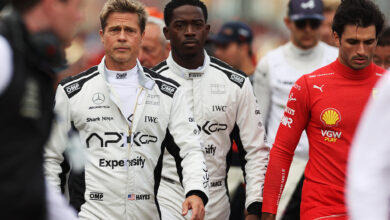“The Expendables,” which had its US release back in August and reached Egyptian cinemas earlier this month, managed to capture the attention of movie-goers long before its release date. Sylvester Stallone–the writer, director and main character in the film–released one statement after another from the shoots, announcing the names of the stars joining the ensemble cast, explaining the “explosive” plot, and sharing x-rays of his neck, broken after shooting a fight scene
None of this, however, helped to explain this mess of a movie.
Dubbed as the brain-dead male version of "Sex and The City 2," the film was negatively reviewed by multiple critics, but critics nowadays are hardly the main players in the movie business; in spite of bad reviews, "The Expendables" managed to score the top spot when released in the US, making US$225 million so far, allowing Sly to brag about a planned sequel and invite Bruce Willis reprise his role as the super villain in the next instalment.
Let’s take a step back, however, and take a look at the plot of this film.
Sylvester Stallone plays Barney Ross, the leader of a group of mercenaries called the Expendables, with Lee Christmas (played by the ever-so-cool Jason Statham) as his second in command. The group, which includes Jet Li, Randy Couture, Dolph Lundgren and Terry Crews, gather at a tattoo parlor owned by Tool (played by the seriously disfigured Mickey Rourke) a retired member of the group and the man who arranges jobs for the Expendables.
Mr. Church (a smiley CIA agent played by Bruce Willis) invites both Ross and his rival Trent Mauser (a short yet hilarious cameo by Arnold Schwarzenegger) to negotiate a new mission. Mauser refuses the mission (because he would rather be a president, as Stallone puts it), while Ross accepts it. He and his team members will travel to the fictional island of Vilena to overthrow its dictator and protect American interests in the area. Of course, when Ross meets the beautiful and mysterious dictator’s daughter, these ruthless mercenaries become model citizens, fighting for freedom.
This mission starts an explosive stream of events which take place all over the island and the streets of New Orleans.
You would think that these group of stars would learn from their past cinematic mistakes, but you would be wrong. The movie is an old-school action flick complete with flat punchlines, ridiculous fight scenes, and fist pumps.
Stunts are at the core of this movie. Stallone fires his gun at a bomb thrown by someone else, causing it to explode and destroy a helicopter. Statham puts on his sunglasses and opens a secret door to the nose of his plane in order to shoot bullets at the island’s army before showering them with gasoline and setting them on fire. Jet Li fights with man three times his size, and wins, using his iconic martial arts techniques. (Bad stunts yield bad jokes: Jet Li asks for more money because he is “shorter,” therefore he works harder than the others.)
The actors are all very skiled at putting on a serious face. They fight, laugh and propose to their girlfriends with serious faces; they even dwell over their heartaches while sporting–you guessed it!–serious faces.
Maybe the only respectable moment for an actor in "The Expendables" is when Tool remembers his days working in Bosnia. That monologue, delivered by Rourke, marks the only believable moment in the film by far.
The story is, at best, silly, with cackling villains and underground dungeons full of cocaine ready to be stolen by anyone. The direction might be the best part of the film, delivering, at least, what it promised: tons and tons of flying bullets and explosions.
Negative reviews can’t make or break a movie anymore, and Stallone knows that very well. He obviously knows that "The Expendables" is not a movie of historical importance. He did not add positively to his career or change the world, and he won’t get an Oscar. But, by relying deeply on the element of male bonding–where, following a flying bullet or explosion, male A tells male B, “Dude, that was cool!”–he brought in the cash, and cash, not critics, is what Hollywood is all about these days.




